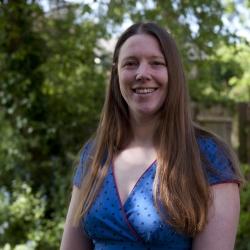Biography
Catherine Wilson completed her Ph.D. studies with Prof. Julian Sampson and Prof. Jeremy Cheadle in the Department of Medical Genetics in Cardiff University where she determined the role of Harmatin (Tsc1) in a novel model of renal cell carcinoma. She then moved to the Wellcome Trust Sanger Institute to work with Dr David Adams, focusing on functional validation of intestinal cancer genes. Catherine then moved the Department of Biochemistry in the University of Cambridge to work with Prof. Gerard Evan where she focused on Myc, a highly pleiotropic, basic helix loop helix transcription factor involved in cell replication, differentiation, metabolism and apoptosis. In October 2019, Catherine was appointed as a University Lecturer at the Department of Pharmacology, University of Cambridge.
In 2020 Cathy spoke to The Naked Scientists about her work on Myc in the heart https://www.thenakedscientists.com/podcasts/short/cancer-gene-vital-heart-regeneration
Research
The adult heart is one of the least regenerative organs of the body. Post myocardial infarction (MI) the default response of the adult mammalian heart is to replace the lost cardiomyocytes with non-contractile fibrotic scar tissue that frequently results in heart failure. We have recently discovered that transient co-expression of Myc and Cyclin T1 is capable of reactivating extensive cardiomyocyte proliferation in the adult mouse heart. This observation is a significant contribution to the regenerative field that may eventually have therapeutic application in the treatment of heart disease. We aim to exploit this striking observation by determining whether it is possible to drive functional regeneration of injured hearts and evaluate the potential of a new therapeutic strategy.
Publications
Bywater, M. J. et al: ‘Reactivation of Myc transcription in the mouse heart unlocks its proliferative capacity.’ Nature Communications, April 2020. DOI: 10.1038/s41467-020-15552-x
Kreuzaler P*, Clarke M*, Brown E, Wilson CH, Piterman N, Littlewood TD, Evan GI, Fisher J. Heterogeneity of Myc Expression in Breast Cancer Reveals New Susceptibilities through Executable Mechanistic Modelling (2019). PNAS 116 (44), 22399-22408. https://doi.org/10.1073/pnas.1903485116.
Kortlever RM, Sodir NS, Wilson CH, Burkhart DL, Pellegrinet L, Brown Swigart L, Littlewood TD, Evan GI. Myc cooperates with Ras by programming inflammation and immune suppression (2017). Cell 171(6):1301-1315.e14. https://doi.org/10.1016/j.cell.2017.11.01
Gamper I*, Burkhart DL*, Bywater MJ*, Garcia D*, Wilson CH, Kreuzaler PA, Arends MJ, Littlewood TD, Zheng Y, Perfetto A, Evan GI. Determination of the physiological and pathological roles of E2f3 in adult tissues (2017). Sci Rep 7(1):9932. https://doi.org/10.1038/s41598-017-09494-6
Hall Z, Ament Z*, Wilson CH*, Burkhart DL*, Koulman A, Littlewood TL, Evan GI, Griffin JL. Myc linked to aberrant lipid metabolism in lung cancer by mass spectrometry imaging (2016). Cancer Research 76(16):4608-18. * Joint second author. DOI: 10.1158/0008-5472.CAN-15-3403

